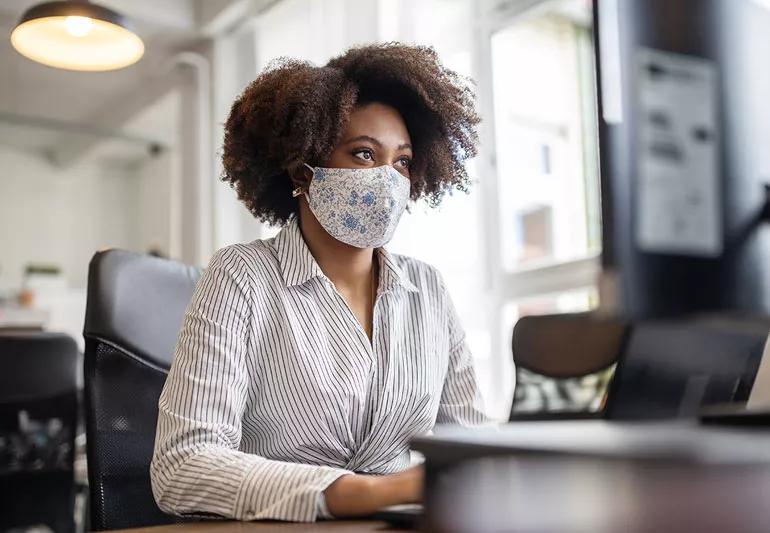Reduce the stress with a few helpful tips from a psychiatrist

Image content: This image is available to view online.
View image online (https://assets.clevelandclinic.org/transform/2182f9b5-f199-4a43-a8d2-2ce0f52cc3f8/anxietyCovidMask-1248901260-770x533-1_jpg)
woman wearing a mask at work because of covid
So far, face mask conversations seem to go one of two ways — a debate about why people will wear one or a debate about why they won’t wear one. But in the middle of the polarization, there’s another stance that we might not be taking into consideration. Some people might want to wear masks to help stop the spread of COVID-19, however, the thought of actually doing it can cause a great deal of stress or even panic. This is known as mask anxiety.
Advertisement
Cleveland Clinic is a non-profit academic medical center. Advertising on our site helps support our mission. We do not endorse non-Cleveland Clinic products or services. Policy
Mask anxiety is a very real thing for people who have anxiety disorders or a history of claustrophobia. Psychiatrist Brian Barnett, MD, says the symptoms can manifest psychologically or physically.
“While some people with mask anxiety may experience only psychological manifestations, others may have symptoms such as rapid heart rate, shortness of breath, chest tightness, sweats and dizziness,” says Dr. Barnett. But for those who’ve never felt these sensations before, he adds that it can be overwhelming and difficult to understand that the symptoms they’re experiencing are actually related to anxiety.
While it might take help from a professional, Dr. Barnett says that it is possible to overcome mask anxiety. It can be done with the assistance of medication, therapy or a mindset change.
“Mask anxiety, like most forms of anxiety, can be overcome either through self-directed interventions or by seeking professional help through cognitive behavioral therapy or anti-anxiety medications,” says Dr. Barnett.
Here, he shares a few things that you can do at home to help make the process less stressful.
To desensitize yourself to the sensation of the mask on your face, Dr. Barnett suggests wearing one at home so when you have to put a mask on in public, it’s no big deal after a while. If necessary, start with small stretches of time and then try to tolerate your mask for longer periods. Dr. Barnett says many people find shopping for the right style and type of mask fun and empowering. And for a more personalized and calming touch, try adding aromatherapy scents to make the mask more tolerable.
Advertisement
This includes being afraid that the airflow to your lungs is being reduced when you wear a mask. Dr. Barnett says to keep in mind that health professionals have been wearing masks regularly for more than a century without any adverse health effects. He also suggests reminding yourself that contracting COVID-19 while not wearing a mask is far more dangerous to your health than feeling uncomfortable while wearing one is. And don’t forget that wearing a mask, even if it makes you anxious, is one of the few ways that you can maintain control over this unsettling situation.
Thicker masks can provoke mask anxiety for some people. In this case, Dr. Barnett recommends finding a cloth mask that’s more comfortable or giving a surgical mask a try. If the switch doesn’t help and your anxiety starts to get in the way of your safety by preventing you from wearing a mask, seek professional help. Cognitive behavioral therapy or exposure therapy may be necessary to help reduce or even eliminate your mask anxiety.
Advertisement

Sign up for our Health Essentials emails for expert guidance on nutrition, fitness, sleep, skin care and more.
Learn more about our editorial process.
Advertisement
How taking in too many gruesome stories can impact your well-being
Most recommended precautions center around minimizing bruising or swelling
Even one drink can have an impact on your cognitive function leading to slurred speech, blurred vision and impaired memory
Understand who may (and may not) benefit
Lorem ipsum dolor sit amet. Et odio Quis vel ipsam omnis eum alias deleniti et placeat impedit non voluptas galisum hic autem enim et cupiditate aliquid. Est beatae quidem non facilis autem ut commodi nisi aut tempore rerum et dolores voluptatem cum enim optio id sapiente quasi. Ad laboriosam officiis 33 cupiditate sequi ea voluptatum consectetur qui necessitatibus voluptate et quasi doloremque et facere explicabo quo explicabo officia
Seeking help through therapy can be an important step in improving your quality of life when you have UC
Type 2 diabetes isn’t inevitable with these dietary changes
Applying a hot or cold compress can help with pain
Pump up your iron intake with foods like tuna, tofu and turkey